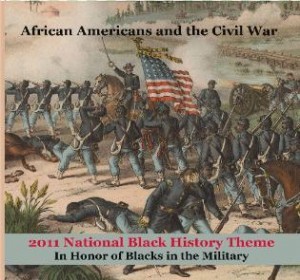February is Black History Month! Founded by Carter G. Woodson in 1926 and beginning as Black History Week, Black History Month seeks to recognize and honor the significant achievements of African Americans. The Association for the Study of African American Life and History leads this effort by promoting, preserving and researching the history and culture of African Americans as well as by setting the annual theme for Black History Month every year. The 2011 theme is “African Americans and the Civil War.” During Black History Month we celebrate the extraordinary African American leaders, scientists, educators, athletes, artists, entertainers, pioneers, social activists, public servants and other great individuals, who have achieved significant accomplishments and made major impacts on our communities, nation and the world. Black History Month has become particularly meaningful to the African American community because it has helped to enhance self-esteem and provide the community with a sense of cultural achievement, identity, and pride.
Despite its honorable intentions and notable significance, Black History Month does have its critics. As an American historian, specializing in African American history, I along with many others recognize its shortcomings. There are inherent weaknesses in acknowledging and celebrating a history of a great people during only one month out of the year, when it should be celebrated all year long. Why should we celebrate black history only one month and during the shortest month of the year? Secondly, black history has been compartmentalized instead of being incorporated into the wider narrative of American history. Due to the fact that African Americans have been present and contributors during every phase of the history and evolution of the United States, this history should be integrated into the fabric of American history and not just taught sporadically and through the lens of oppression, specifically slavery and segregation. Third, Black History Month tends to focus on the history of African Americans, when it should expand to include the entire pan-African experience. Black history began way before 1619 and stretches beyond the United States. Including ancient African civilizations and the Afro-Latino experience in the Caribbean and Central and South America will provide a global perspective of the legacy of black people. Lastly, Black History Month needs to acknowledge the living legends of the African American community instead of primarily focusing on the deceased. The Grio’s 100 History Makers in the Making is a step in this direction. Although we all realize the importance of recognizing our ancestors, we must also pay tribute to the giants who walk among us.
One of my most memorable experiences in my baptist church during my childhood in Brownwood, Texas, was celebrating Black History Month. I remember the faces and short biographies of African American historical figures, who were posted on the wall of our fellowship hall for all of our members to see and learn about our history. Now I have my own set of personal African American heroes and sheroes, who have achieved greatness in my own eyes, posted on my mental wall–local and national as well as the living and deceased. Among them are my parents Cecil and Loretta Houston, my paternal grandfather Bennie Will Houston, Sr., my college mentor Dr. Alma Renee Williams, my former Sunday School teacher Sis. Dora Flenoy and businesswoman Juanita Baranco. Others include Harriet Tubman, Malcom X, W.E.B. DuBois, Michael Jackson, Oprah Winfrey and Michelle and Barack Obama. These are just a few African Americans who I celebrate. Who are some of the African American heroes and sheroes that you celebrate this month and onward? I look forward to your comments.




1 comment
Comment by Charles
Charles April 24, 2011 at 1:27 pm
For months, I have been thinking about the march in Washington D.C. to “Reclaim The Dream.” I wanted to hear what others in attendance thought, not to take their thoughts as my own, but to let the whole experience wash over me before talking or writing about it. But this was such a special experience, I felt like I needed the time to think back over what happened.
First of all, kudos to the Rev. Al Sharpton and his National Action Network for working with other organizations to put the “Reclaim The Dream” event together. On the 47th anniversary of Dr. Martin Luther King’s “I Have a Dream” speech, the original location was not available, no problem. Rev. Al and others kept it moving and chose another location. In this case, the march began with speeches at the district’s Paul Laurence Dunbar High School. The destination of the march was the construction site of the memorial honoring Dr. King on the National Mall.
The organizations represented included the National Action Network, the NAACP, the National Urban League, labor and education groups, black farmers and media. Speeches were given, memories shared and promises made.
What struck me – and has stayed with me – are the young people and children in attendance. Some came on their own, others brought by a relative, family friend or teacher. The young people talked about what Dr. King’s dream meant to them, but the passion came when they shared their own dreams.
How great was it to see kids perched on the shoulders of a parent! And the conversations the parents were having with the children as they made that four- to five-mile trek from Dunbar to the King memorial site. They talked about Dr. King and what he meant to this country and to the world. But then the direction changed, as the parents asked the kids what this day looked like to them and what their dreams were.
I so commend the men and women who included the children and young adults in this event. Even if your young charge was a tad bit too big to carry on your shoulders, it was obvious that you remembered those people on whose shoulders you stand, and now you continue that tradition. The dream lives on!